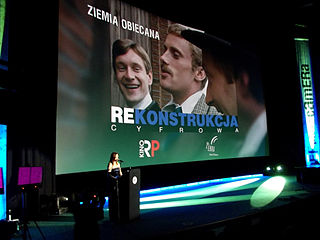
The history of cinema in Poland is almost as long as the history of cinematography, and it has universally recognized achievements, even though Polish films tend to be less commercially available than films from several other European nations.

Andrzej Żuławski was a Polish film director and writer best known for his 1981 film Possession. Żuławski often went against mainstream commercialism in his films, and enjoyed success mostly with European art-house audiences.

Passenger is a 1963 Polish feature film directed by Andrzej Munk. When Munk died in a car crash during production, the unfinished film was assembled for release by directors Witold Lesiewicz and Andrzej Brzozowski.

Jerzy Oskar Stuhr was a Polish film and theatre actor. Considered one of the most popular, influential and versatile Polish actors and an icon of Polish cinema, he also worked as a screenwriter, film director, voice actor and drama professor. He served as the rector of the Ludwik Solski Academy for the Dramatic Arts in Kraków for two terms: from 1990 to 1996 and again from 2002 to 2008.
The European Film Academy is a group of European filmmakers who come together in Berlin on the occasion of the first presentation of the European Film Awards in November 1988.

Polish Film Award, or Eagle is the national film award of Poland. It has been delivered annually since 1999, with the first event held on 21 June, by the National Chamber of Audiovisual Producers (KIPA). Since 2003 they have been awarded by the Polish Film Academy.
The 2002 Polish Film Awards ran on March 9, 2002, at Royal Palace, Warsaw. It was the 4th edition of Polish Film Awards: Eagles.

The Hexer or The Witcher is a 2001 Polish fantasy film directed by Marek Brodzki and written by Michał Szczerbic. It stars Michał Żebrowski as Geralt of Rivia. The story is based on the books and stories of The Witcher written by Polish author Andrzej Sapkowski.
Piotr Trzaskalski is a Polish film director and screenwriter.

Krystyna Jolanta Janda is a Polish film and theatre actress, director, and singer. She is best known internationally for playing leading roles in several films by Polish film director Andrzej Wajda, including Man of Marble and Man of Iron. She is widely considered one of the most popular and successful Polish actresses of her generation and an icon of Polish cinema.

The Gdynia Film Festival is an annual film festival first held in Gdańsk (1974–1986), now held in Gdynia, Poland.

New Horizons Film Festival is an international film festival held annually in July in Wrocław, Poland. It has been organised since 2001. It is one of the biggest and most popular film festivals in Poland. Since 2008 it is accredited by FIAPF with an "avant-garde" specialised competitive status.
American Film Festival is a film festival held annually in October in Wrocław, Poland. The first festival was held from 20 to 24 October 2010. The festival is organized by Stowarzyszenie Nowe Horyzonty and co-funded by the Wroclaw Municipality and Polish Ministry of Culture and National Heritage.

New York Polish Film Festival is a film festival held annually in New York City since 2005. Its mission is to present and promote Polish cinema in the United States, to expose an American audience to Polish films, as well as to offer Polish filmmakers a rare opportunity to showcase their works in a major cultural center such as New York. Each year the festival presents acclaimed selections of features, short films, animations and documentaries of Polish filmmakers regardless of the country where films were made. NYPFF is the only annual presentation of Polish films in New York City and the largest festival promoting and presenting Polish films on the East Coast.

Ida is a 2013 drama film directed by Paweł Pawlikowski and written by Pawlikowski and Rebecca Lenkiewicz. Set in Poland in 1962, it follows a young woman on the verge of taking vows as a Catholic nun. Orphaned as an infant during the German occupation of World War II, she must meet her aunt, a former Communist state prosecutor and only surviving relative, who tells her that her parents were Jewish. The two women embark on a road trip into the Polish countryside to learn the fate of their relatives.
Edi is a 2002 Polish drama film directed and co-written by Piotr Trzaskalski. It received critical acclaim and eleven Polish Film Award nominations, winning two for Best Supporting Actor and Audience Award.

Jewish Motifs International Film Festival is a major Jewish-themed film festival held annually in Warsaw, Poland. The festival has been held every year since 2004.

Life Feels Good is a 2013 Polish drama film directed by Maciej Pieprzyca.

The Zbigniew Cybulski Award is a Polish annual film award given to best young Polish actors. It was established in 1969 on the initiative of Wiesława Czapińska and named to commemorate Zbigniew Cybulski who is widely considered one of the greatest Polish actors of the second half of the 20th century. It is among the most prominent awards in Polish cinema and the past winners include some of the most popular and critically acclaimed Polish actors. It was continuously awarded by the film magazine Ekran from 1969 to 1995 and after a ten-year hiatus it was reactivated in 2005 by the Kino Foundation. In 2008, the foundation published a book Być jak Cybulski?, which is devoted to all the past recipients of the award.